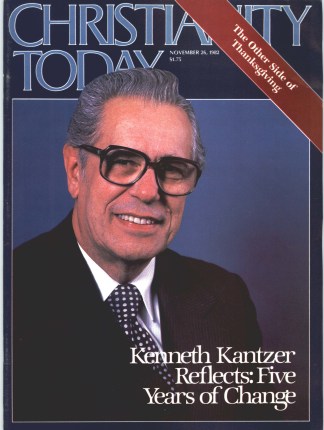Hunger and need are the Christian’s opportunity for compassion.
“Lean years”—the phrase comes from Genesis. Characteristically, however, we do not remember its context as “The Story of the Lean Years” but “The Story of Joseph the Provider.” Perhaps we should revive this side of the story.
Joseph seems the type for our time. He says the nature of his commission is “to preserve life,” or “to keep alive many survivors” (Gen. 45:5–7). This is no isolated position in Scripture. “Preserving” gains centrality in the New Testament when Jesus equates “to do good” with “to save life” (Mark 3:4). His actions show he fulfilled the promise of Joseph’s example: he sustained people both physically and spiritually.
Moreover, he called his disciples to participate in his ministries. The parable of the Good Samaritan makes preserving life central to Christian ethics. It is a basic form of love toward our neighbor: Christianity is a relief and rescue enterprise. In his parables on stewardship, Jesus generalizes the model of Joseph the Provider, making it a rule for all believers. We are to be like “the faithful and wise servant, whom the master has put in charge of the servants in his household to give them their food at the proper time” (Matt. 24:45).
We associate Joseph especially with stewardship. This immediately applies to the battle against world hunger recently described as equivalent to William Wilberforce’s struggle to abolish slavery. To continue Christ’s ministry on earth, the church must provide those in need with the material means for life. “Keeping alive … many survivors” ought to become the conscious commitment of Christians today: we are meant to be providers of people. One would expect Christian businessmen in the lineage of Joseph to show special creativity in upholding existing jobs and creating new ones.
Besides feeding the poor of the world there is the task of spiritual provisioning. North American society is hardly less corroded by secularism than its European counterpart, with all its destructive side effects on people both inside and outside the churches. Our mandate is continually to improve the moral and spiritual substance in these lands through preaching and applying the gospel.
The church always needs both apostles and deacons. We must stand on both legs. Evangelicals must simply subscribe to the biblical order that there are these two intermeshed ministries. Jesus made this clear when in one of his parables he described himself as a man going on a journey who puts his servants in charge, “each with his work.” One-sidedness would be a rebuff to the Master’s instruction. It would also deny the varied gifts of the Spirit and the biblical idea of the church as a body with different members.
Joseph also exemplifies the principle of the creative minority. Like Daniel at the court of the Chaldeans, Joseph in exile shows more care for the people of his host country than even the local authorities do. He takes action when those in charge are helpless or blind. So the provider principle also applies in alien surroundings; the Christian’s milieu does not have to be congenial. It is our God-given program to a secular society. Joseph follows the command of Jeremiah 29:7 to “seek the welfare of the city where I have sent you into exile.”
In dark times new light has always come through individuals and small groups dedicated to seeking God, the source of all light. Those willing to receive from God became the providers for humanity, keeping people spiritually, and then also physically, alive.
Further, the story of Joseph is a paradigm for crises. Joseph sustained a nation in a time of violent change from affluence to famine. One man who had a vital, living relationship with the higher wisdom of the Creator became instrumental in preserving the lives of millions.
The story is also an example of what has been called “a panic-proof experience of the guidance of God.” Joseph says: “God has sent me … to preserve life.” This is like Paul on the stricken ship in the Mediterranean. With the experts at their wits’ end, he followed the instructions God gave him in prayer and saved the whole ship’s company. Crises seem to be a climate in which Christianity thrives and Christians get to the helm. Ours is not a fair-weather religion; we have resources beyond the visible.
Finally, some experts today think Western economies are not merely experiencing a passing recession, but are becoming aged. They envisage a general deterioration, first mental and cultural, then economic, with no recovery. Historian Arnold Toynbee has noted that generally civilizations grow up, blossom, wither, and decay; and that in past history Europe alone has been able to evade this iron law because, through its association with Christianity, more than once it has found unexpected renewal.
Perhaps we are facing a similar moment, where the spiritual and material discomfort of Western society may be either the symptom of an illness unto death, or the condition that caused the Prodigal Son to return home. Much will depend on Christians, on whether we shed our private concerns and heed Christ’s call to be providers for humanity in his footsteps. God wants us to be purveyors of bread, and of the Bread.
Klaus Bockmühl is professor of theology and ethics at Regent College, Vancouver, British Columbia, Canada.










